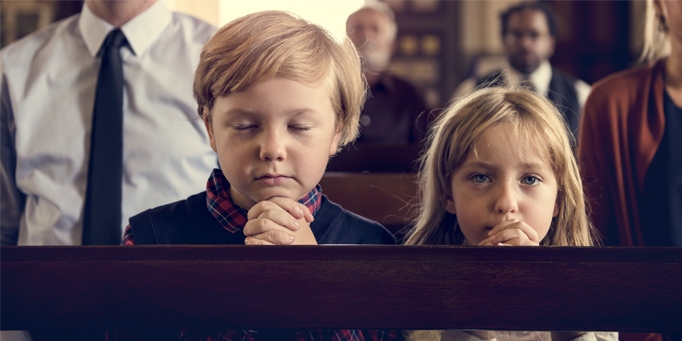
Kingdom kids: God’s sovereignty in salvation
A biblical framework for parents and churches.
Last time, we looked at a biblical case for considering children born into households with at least one believing parent as ‘kingdom kids’ from birth. We saw this as a presumption of covenant membership—one which requires ongoing discipleship and a future personal embrace of faith. Ultimately, no-one gets a ‘free pass’ into God’s kingdom—salvation is always by grace alone through faith in Jesus alone.
All of this naturally leads us to the profound doctrine of God’s sovereignty. As Romans 9:16–21 powerfully states:
‘[Salvation] does not, therefore, depend on human desire or effort, but on God’s mercy. For Scripture says to Pharaoh: “I raised you up for this very purpose, that I might display my power in you and that my name might be proclaimed in all the earth.” Therefore God has mercy on whom he wants to have mercy, and he hardens whom he wants to harden. One of you will say to me: “Then why does God still blame us? For who is able to resist his will?” But who are you, a human being, to talk back to God? “Shall what is formed say to the one who formed it, ‘Why did you make me like this?’” Does not the potter have the right to make out of the same lump of clay some pottery for special purposes and some for common use?”’ (Romans 9:16–21)
This raises a crucial question: What about kids and teens who, after growing up in believing homes, seem to ‘fall away’ from the faith? Were they ever truly ‘kingdom kids’?
Ultimately, only God knows whose names are written in the Book of Life to escape eternal judgement (Revelation 20). In his sovereignty, God also determines the timing of his saving revelation. Consider Paul, to whom Jesus declared, ‘why do you persecute me?’ (Acts 9:4–5), yet later wrote, ‘God, who set me apart from my mother’s womb and called me by his grace, was pleased to reveal his Son in me …’ (Galatians 1:15–16a). We don't know God’s specific timing of revelation for any child, even those who appear to reject him later.
If God set Paul apart before birth not only to be saved by grace but to be an apostle of Christ, then he can, in his timing, bring back to himself those who are currently rejecting him. While we can't presume God will bring about this gospel revelation for every individual, neither can we definitively say that he won't. Therefore, we cannot say with certainty that these children, teens, or adults who grew up in believing families are lost from him forever.
This sobering truth, however, means we might not see them in God’s eternal kingdom on the Last Day. This thought should drive every parent to earnest prayer, asking God to remove anything and everything these children, teens, or adults are clinging to for hope and identity, so they can see their true and only hope in Jesus.
God’s sovereignty demands our trust in his decisions and his timing for the revelation of grace to our kids. To expect otherwise is, at best, to demand something from God that isn't ours to command; at worst, it's to put ourselves above him, thinking we know better. God can reveal the truth of Jesus and gift faith to young children, but he also might not.
Regardless of his sovereign timing, we must remember that God loves our kids more than we ever will. They are his creation, not ours; he is God, and there is no other. Trusting God in his sovereignty means we must also allow him to be sovereign in his mercy (Romans 9:16–21). In the meantime, there is every reason to ‘bring them up in the training and instruction of the Lord’ (Ephesians 6:4), taking seriously this divine command to all parents throughout time.
Even as God made and loves all people, not all children born (even to Christian households) can be guaranteed kingdom membership. This comes through, and is only known by, Jesus. For those of us to whom faith has been given, it seems right to consider our children—be they biological, adoptive or even the kids in our church family—‘kingdom kids’ until such time as their heart and actions definitively indicate otherwise. Let’s do all we can, with a louder ‘voice’ than what they are hearing from the world, to proclaim that their true identity has been won by Jesus. As Paul states in Ephesians:
‘Then [they] will no longer be infants, tossed back and forth by the waves, and blown here and there by every wind of teaching and by the cunning and craftiness of people in their deceitful scheming. Instead, speaking the truth in love, [they] will grow to become in every respect the mature body of him who is the head, that is, Christ. From him the whole body, joined and held together by every supporting ligament, grows and builds itself up in love, as each part does its work.’ (Ephesians 4:14–16)
---
A longer version of this article originally appeared at Hunter Bible Church and has been republished with permission.
---
Andrew is married to Kim and is dad to three sons. He has been leading the ministries to Youth and Kids on team at Hunter Bible Church, Newcastle since 2011.

The Child in God's Church
In 'The Child in God’s Church', Tim Beilharz provides the biblical reasons for including and nurturing children as precious members of the body of Christ.
For more articles from Growing Faith, subscribe to our monthly e-newsletter.
To hear about the latest books and resources from Youthworks Media, subscribe here.








